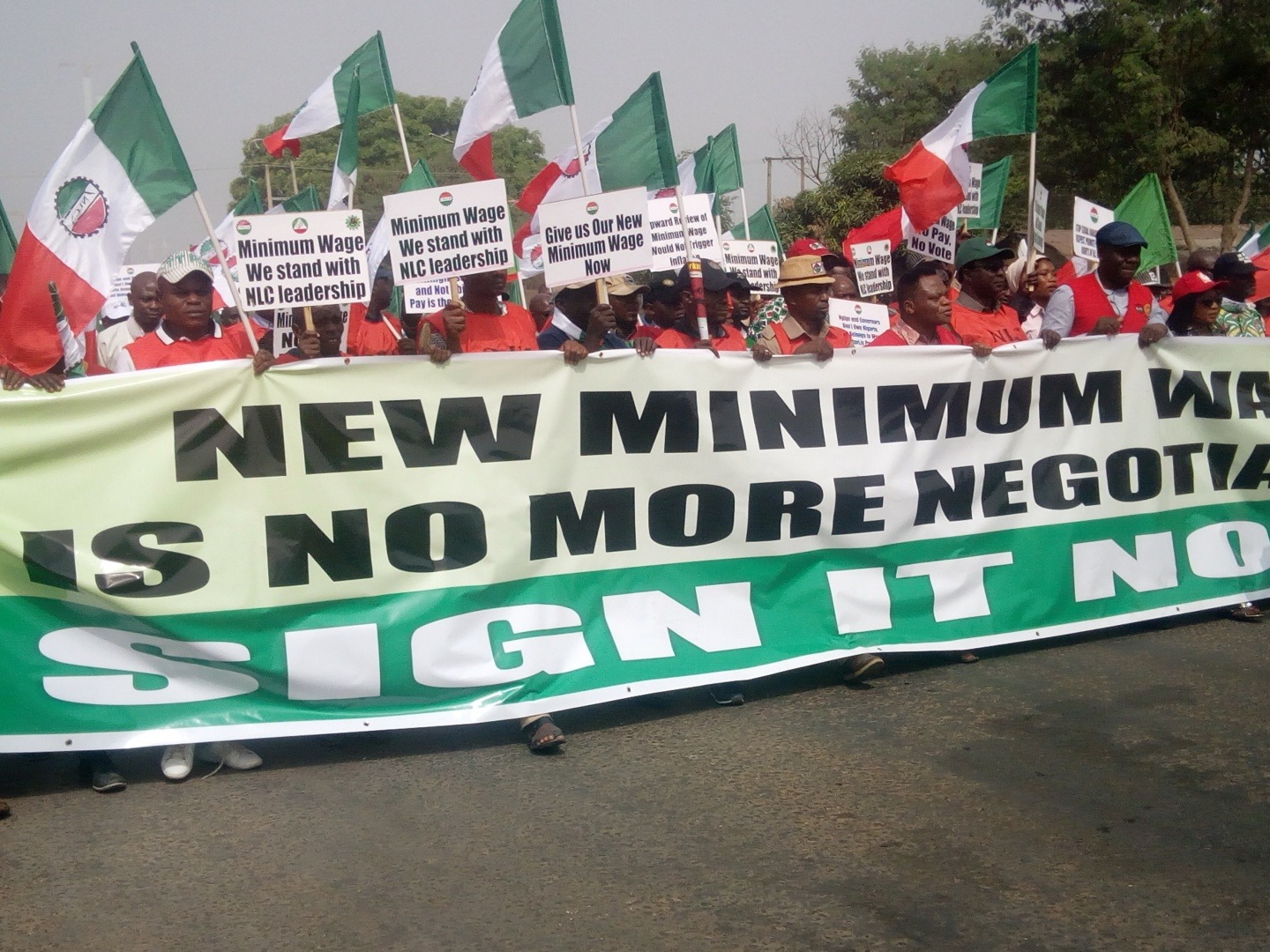Organised Labour, comprising the Nigeria Labour Congress (NLC) and the Trade Union Congress (TUC) made good their threat to go on strike by end of May if the Federal Government failed to conclude negotiations on a new minimum wage. A nationwide strike started on Monday 3rd June and ended abruptly on Tuesday 4th June. The strike was suspended for five days as they continue negotiations with the Government.
The Minimum Wage Act, signed into law by former President Muhammadu Buhari, expired in April. By implication, the existing minimum wage of N30,000 had expired, and it is illegal for governments and other employers of labour to continue to abide by it, hence the call on government to negotiate a new one.
Labour is demanding an increase in the minimum wage to four hundred and ninety-four thousand Naira (494,000), but the federal government has only offered sixty thousand Naira (60,000). This strike highlights the severe financial difficulties faced by civil servants and many other Nigerians.
The government has made life harder for citizens by removing fuel subsidy. This has caused the prices of essential goods and services to rise sharply, making it difficult for ordinary people to afford basic needs. Despite these rising costs, the government has not increased the minimum wage enough to help workers cope with the higher cost of living.
For an instance, before president Bola Tinubu removed fuel subsidy, the price of one mud of rice was N300, now one mud of rice is N1,600, yet the minimum wage has not increased accordingly. This has put civil servants and other citizens in a tough financial situation. Many cannot afford three square meals a day, and some struggle to afford even one.Therefore, in economic statistics, when expenses are higher than income, financial trouble is inevitable.
This is the reality for many Nigerians, especially civil servants and other unemployed people. The removal of fuel subsidy has only made things worse, leading to higher costs for basic necessities like food items and other products. The government has also removed subsidy on electricity, further straining household budgets.
There is no gainsaying the fact that the inability to afford a decent standard of living has broader social implications. Desperation and financial instability can drive people towards criminal activities such as kidnapping, banditry, and armed robbery. The current economic climate is fostering a sense of hopelessness, which can destroy social harmony and peace.
To improve the situation, the government must take steps to empower its citizens. Increasing the minimum wage to a sufficient amount is a crucial first step. For example, a person with a spouse and three children needs at least three hundred thousand naira (N300,000) per month to cover basic expenses like food, school fees, and transportation. Without a fair wage, civil servants cannot be expected to perform their duties effectively, as their financial struggles overshadow their professional responsibilities.
Contrarians to Labour’s request like the former Deputy Governor of the Central Bank of Nigeria (CBN), Kingsley Moghalu, says Nigeria’s productivity level can’t support the ₦494,000 minimum wage demanded by Organised Labour. They are of the view that if we had a truly productive economy there is no reason we can’t have the kind of minimum wage demanded by Labour. Additionally, they believe the minimum wage is not just about government salaries. There are not more than 2, at most 3 million civil servants in Nigeria. It is even more about what is paid in the private sector, to household staff, etc. Hence the impracticability of that amount.
As the NLC has now suspended the strike for five days to continue negotiations with the government, this is an opportunity for the government to act promptly and prevent the strike from resuming. The ongoing financial issues in our country are causing immense suffering among citizens due to poor government policies. It is crucial for the government to do the right thing at the right time.To address the demand for an increase in the minimum wage, here are a few strategies Nigeria could consider and adopt:
1. Economic Growth Policies: Implement policies that stimulate economic growth, such as investment in infrastructure, education, and healthcare, which can create more job opportunities and increase productivity.
2. Productivity Enhancement: Encourage businesses to improve productivity through training programs, technology adoption, and efficient resource management. This can justify higher wages and reduce the impact on inflation.
3. Labour Market Reforms: Review labour laws to ensure fair wages and benefits for workers while also considering the competitiveness of businesses. Balancing labour rights with economic realities is crucial.
4. Social Safety Nets: Implement social safety nets to support low-income families, such as targeted cash transfer programs or subsidies for essential goods and services, which can mitigate the immediate impact of wage increases on vulnerable populations.
5. Fiscal Policy: Adjust taxation and public spending policies to support businesses, especially small and medium enterprises (SMEs), which are often the largest employers in many economies.
6. Inflation Management: Implement measures to control inflation, such as prudent monetary policy, to prevent wage increases from eroding purchasing power over time.
Combining these strategies can help Nigeria improve its economic situation while addressing the demand for an increase in the minimum wage.The government should also introduce programs to empower unemployed individuals. Such initiatives can help reduce crime rates and address the insecurity plaguing the nation.



